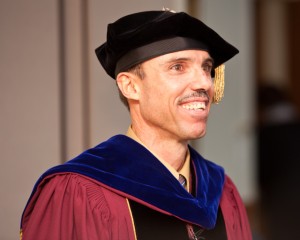This interview showcases information about Dr. Hassan El-Nabih’s dissertation research, how he is following through on what he learned from doing his research, and more.
TIRF:Your dissertation was entitled, “The Acquisition of the English Causative-inchoative Alternation by Arabic Native Speakers.” What was it about and what were your major findings?
Dr. El-Nabih: If you have ever taught English to Arabic native speakers (NSs), perhaps you have noticed sentences like “The rabbit was disappeared” or “The woman laughed the child.” My study investigated Arabic NSs’ acquisition of what is called the English causative-inchoative alternation (e.g., “Tom broke the cup” vs. “The cup broke”). An inchoative verb is one which signals a change of state (e.g., break in the second example above). My data analyses indicated that the English causative-inchoative alternation posed a learnability problem for the Arab participants, including over-passivization (as in “The rabbit was disappeared”). These errors can largely be attributed to L1 transfer, since Arabic is quite different from English in terms of how it encodes the causative-inchoative alternation. In my study, interlanguage development towards target-like English forms was clearly observed across the proficiency groups, but there was still a strong influence of L1 transfer on even the high proficiency participants.
TIRF: Based on your research, what are you doing to address this issue in your classroom?
Dr. El-Nabih: I believe that the subtleties involved in this linguistic phenomenon require that Arab EFL learners receive effective explicit instruction. As a teacher of linguistics and EFL courses, I try to help my Arab students consciously recognize that verbs like swim and laugh (and their equivalents in Arabic) have agentive subjects, whereas verbs like die and disappear (and their equivalents in Arabic)have non-agentive subjects. I also explicitly emphasize the differences between causative, inchoative, and passive structures, so that my students can discover the relationship between these linguistic constructions and their communicative functions. I point out that a causative structure (e.g., “Tom broke the cup”) denotes a bringing about a change of state: It can be paraphrased in terms of cause (“Tom caused the cup to break”), while an inchoative structure (e.g., “The cup broke”) only denotes a change of state and can be paraphrased in terms of become plus an adjective (“The cup became broken”).
Similarly, I highlight the differences between the passive and inchoative structures. The passive has an implied agent, whereas the inchoative lacks an agent. That is, inchoative situations occur spontaneously. Instruction can explicitly emphasize the fact that variation in agentivity accounts for how passives and inchoatives differ in what expressions they allow. For example, passives — but not inchoatives — allow agentive by-phrases, agent-oriented adverbs (e.g., carelessly), and purpose clauses. In contrast, non-agent-oriented adverbs, such as spontaneously, by itself, and on its own are allowed in inchoatives, but not in passives. I try to draw my students’ attention to the salient linguistic differences between English and Arabic in terms of these features.
TIRF: What did you learn about doing research in the process of completing your dissertation?
Dr. El-Nabih: Throughout my doctoral program at Boston College, I had 20 graduate courses, which broadened my academic horizons remarkably and provided me with state-of-the-art knowledge about conducting research quantitatively and qualitatively. In one of the courses, the Dissertation Seminar, I gained brilliant ideas about the format and content of a proposal and dissertation. In addition, through the cross registration program, I received insightful comments and ideas in a directed study course under the supervision of Professor Paul Hagstrom, a Boston University expert in Linguistics and Second Language Acquisition. Designing and piloting my dissertation instruments were special outcomes of these meetings.
TIRF: What are your current research interests, and how did your dissertation influence them?
Dr. El-Nabih: I love teaching and doing research in linguistics. Second language acquisition is the research area that most appeals to me. Following an avenue for future research suggested in my dissertation, I am currently studying two groups of Arabic NSs to explore the effects of explicit and implicit instruction on certain types of English verbs. In this research, I argue that explicit instruction is more effective than implicit instruction in the teaching of English verb types.
TIRF: Where are you currently working and what does your position involve?
Dr. El-Nabih: Since 1997, I have been a full-time lecturer of courses in Linguistics and EFL at the Islamic University of Gaza, Palestine. My experiences during my MA and PhD programs have had a positive influence upon my teaching career.
TIRF: What did receiving a Sheikh Nahayan Fellowship mean to you?
Dr. El-Nabih: The Sheikh Nahayan Fellowship administered by TIRF is a prestigious award intended to stimulate English language education research in the Arabic-speaking world. Receiving one of these fellowships was a great honor for me. It was an affirmation of the tremendous work I was undertaking. This fellowship significantly boosted my self-confidence and motivated me to concentrate more on my doctoral work and finish it quickly and efficiently. My special gratitude must go to all those who made the Fellowship program a reality.
TIRF: What advice would you give people who are just beginning their doctoral research?
Dr. El-Nabih: I believe that one’s doctoral work will shape his/her future; therefore, choosing a field to carry out such work is critical. In addition, deciding what constitutes an important problem for doctoral research means passing an important milestone on this road. Furthermore, having a supervisor who has the time and knowledge to help implies that the doctoral student is on the right track. Moreover, it is essential that a doctoral student is self-confident and loves what he/she is doing in this challenging experience. Finally, I believe that hard work surely pays off.
TIRF: What would you say to someone who is considering donating to TIRF?
Dr. El-Nabih: TIRF is doing a great job in the field of English language education research. Therefore, I strongly encourage anyone who is interested in promoting scientific inquiry in this field to consider donating to TIRF.


